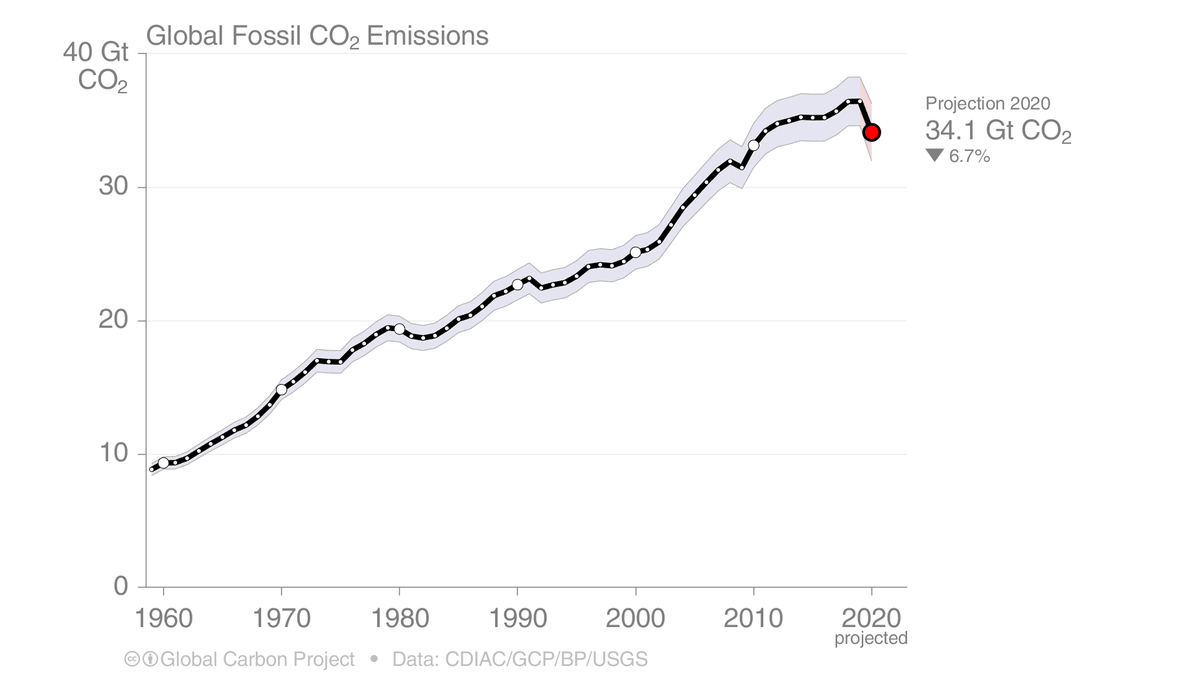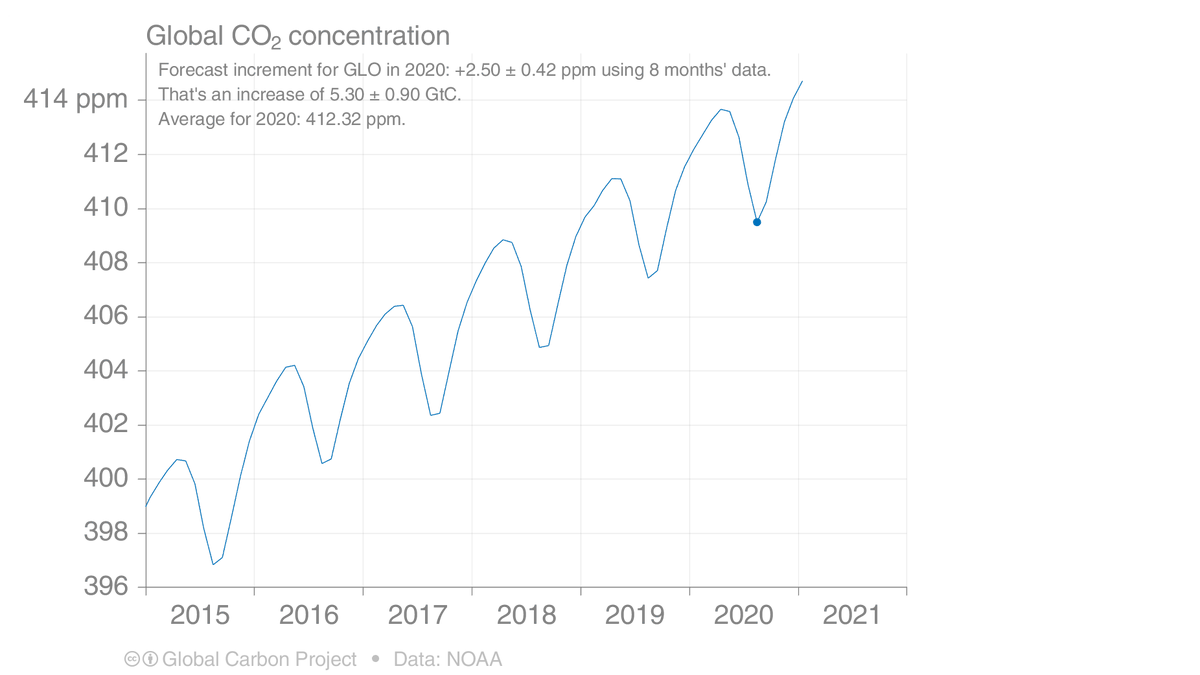Discover and read the best of Twitter Threads about #CarbonBudget
Most recents (14)
🚨NEW STUDY🚨
"Six models are used in a recent study to analyze the climatic, environmental & socio-economic consequences of #overshooting a C budget consistent with the 1.5°C temp target along the cause-effect chain from emissions & #CarbonRemovals to climate risks & impact."
🧵
"Six models are used in a recent study to analyze the climatic, environmental & socio-economic consequences of #overshooting a C budget consistent with the 1.5°C temp target along the cause-effect chain from emissions & #CarbonRemovals to climate risks & impact."
🧵

"Global climatic indicators such as CO2-concentration and mean temperature closely follow the #CarbonBudget #overshoot with mid-century peaks of 50 ppmv and 0.35°C, respectively."
2/10
2/10
Findings of this study highlight that "investigating #overshoot scenarios requires temporally and spatially differentiated analysis of climate, environmental and socioeconomic systems."
3/10
3/10
1. Tuesday 🧵PART 2. Before we talk about #ClimateChange, we might have a look at what happens to all the #Carbon coming off the bogs and into the rivers and lakes, i.e. the transport of terrestrials stores of Carbon to the sea. This is a great infographic from the @c_cascades 
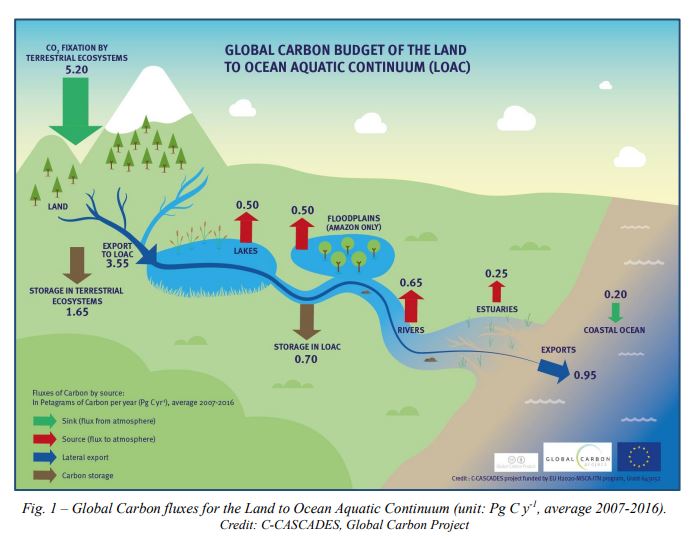
2. Current estimates put this at about 5.1 Pg of C per year, although most people expect this to rise, considering the high uncertainty, ongoing anthropogenic impacts, and continual refinement of the science aslopubs.onlinelibrary.wiley.com/doi/10.1002/lo…
3. One of the parts of this carbon is Dissolved Organic Carbon (DOC) which is the brown colour that you see in bog streams – those of you with water supplies coming off bogs will be familiar with this kind of change
#Thread
#Carbonequation points to ltd #carbonbudget. There is also a #trustequation linked to past (in)actions. If trust equation is undermined, there'd be little hope 4 integrity of carbon equation. @climateactiontr’s analysis imp but incomplete. Read👇
#Carbonequation points to ltd #carbonbudget. There is also a #trustequation linked to past (in)actions. If trust equation is undermined, there'd be little hope 4 integrity of carbon equation. @climateactiontr’s analysis imp but incomplete. Read👇
Here are 6 reasons:
1. Let's start with the future.
Even with the latest pledges, by 2030, #China, the #US & the #EU would consume 45% of available carbon space for 1.5 °C.
2. By 2050, they will consume nearly 90% of the available carbon space.
2/n
1. Let's start with the future.
Even with the latest pledges, by 2030, #China, the #US & the #EU would consume 45% of available carbon space for 1.5 °C.
2. By 2050, they will consume nearly 90% of the available carbon space.
2/n
3. Shall we open the history books now?
In the pre-2020 #climateaction regime, developed countries collectively consumed a whopping 25 GtCO2eq additional carbon space - equivalent to almost 50% of annual global emissions.
3/n
In the pre-2020 #climateaction regime, developed countries collectively consumed a whopping 25 GtCO2eq additional carbon space - equivalent to almost 50% of annual global emissions.
3/n
#Thread #NewStudy
Netzero announcements ✅
But is the available carbon space being fairly shared?
➡️by 2050, China, the US, & the EU are likely to occupy over 90% of the available 1.5°C #carbonspace.
➡️by 2030, they would consume 45% of the available carbon space.
Read 👇
Netzero announcements ✅
But is the available carbon space being fairly shared?
➡️by 2050, China, the US, & the EU are likely to occupy over 90% of the available 1.5°C #carbonspace.
➡️by 2030, they would consume 45% of the available carbon space.
Read 👇

The study also found that the #netzero commitments made by the 10 big emitters are inadequate and would surpass the 1.5°C #carbon space by 33% by 2050.
Read #pressrelease📜: bit.ly/3D0UXqv
Read #pressrelease📜: bit.ly/3D0UXqv

We propose that:
➡️the US, China & the EU should consider advancing their #netzero years by a decade & aim to turn net negative by 2050.
✅This would help contain warming within the 1.5°C #carbonbudget threshold suggested by the recent #IPCC report.
➡️the US, China & the EU should consider advancing their #netzero years by a decade & aim to turn net negative by 2050.
✅This would help contain warming within the 1.5°C #carbonbudget threshold suggested by the recent #IPCC report.

La discussione sulla #transizioneenergetica sta trascurando due fenomeni cruciali che ne minano la fattibilità nei tempi e modi stabiliti:
il “cannibalismo energetico” e “l’effetto Regina Rossa”
l'analisi di Michele Manfroni, PhD student
@ICTA_UAB
1/12
rivistaenergia.it/2021/10/cannib…
il “cannibalismo energetico” e “l’effetto Regina Rossa”
l'analisi di Michele Manfroni, PhD student
@ICTA_UAB
1/12
rivistaenergia.it/2021/10/cannib…

Cannibalismo energetico
Investire in infrastrutture rinnovabili in un’economia alimentata da fossili (sempre + #carbonintensive) significa inevitabilmente aumentare le emissioni nel breve periodo col rischio di sforare il #carbonbudget prima del 2050
2/
rivistaenergia.it/2021/10/cannib…
Investire in infrastrutture rinnovabili in un’economia alimentata da fossili (sempre + #carbonintensive) significa inevitabilmente aumentare le emissioni nel breve periodo col rischio di sforare il #carbonbudget prima del 2050
2/
rivistaenergia.it/2021/10/cannib…
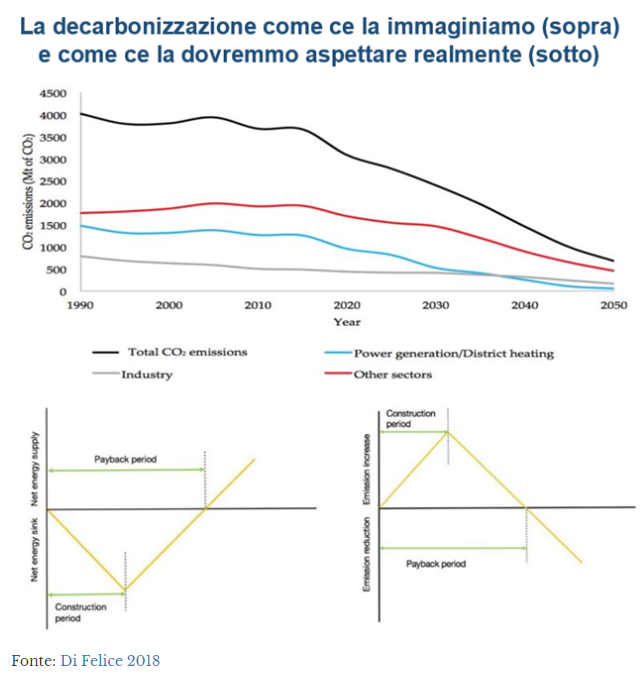
Costruire infrastrutture "verdi" comporta un notevole accumulo di "embodied energy" (detta anche “energia grigia”) nel sistema economico
ovvero l’energia associata con la produzione di qualsiasi bene o servizio, ‘incorporata’ nell’oggetto stesso.
3/
rivistaenergia.it/2021/10/cannib…
ovvero l’energia associata con la produzione di qualsiasi bene o servizio, ‘incorporata’ nell’oggetto stesso.
3/
rivistaenergia.it/2021/10/cannib…
1/6 Our 🌎 is heating and losing crucial carbon sinks. (Look at the #Amazon!)
🌳Tackling climate change means decarbonizing the economy but also recarbonizing our ecosystems
🦥I'm looking at the role of mammals in this task
But wait, mammals absorb CO2?⬇️
#DICECON21 #ConEffect
🌳Tackling climate change means decarbonizing the economy but also recarbonizing our ecosystems
🦥I'm looking at the role of mammals in this task
But wait, mammals absorb CO2?⬇️
#DICECON21 #ConEffect
2/6 Well no *but* they mediate carbon flux:
Grazing by🦌🦘can stimulate🌿growth (more CO2 absorbed). Too much grazing does the opposite!
🐺🦁 influence plant growth by keeping 🦌 in check.
Meanwhile🐰 can ⬆️ soil carbon by digging. So much going on!
#DICECON21 #ConEffect
Grazing by🦌🦘can stimulate🌿growth (more CO2 absorbed). Too much grazing does the opposite!
🐺🦁 influence plant growth by keeping 🦌 in check.
Meanwhile🐰 can ⬆️ soil carbon by digging. So much going on!
#DICECON21 #ConEffect

3/6 Mammal functions are so complex #climate scientists are ignoring them in #carbonbudget relying on 🛰️ images of 🌍vegetation.
But their role matters: by some estimates 🐺control of 🦌in North America could offset emissions of up to 20mn 🚗/year!
#DICECON21 #ConEffect
But their role matters: by some estimates 🐺control of 🦌in North America could offset emissions of up to 20mn 🚗/year!
#DICECON21 #ConEffect
Tuning an ear into online #earthforum21 today...in between my day job. Started with sobering truths on carbon budgets from @KevinClimate... In particular the fundamental flaw of #netzero language of recent years 1/
@TyndallCentre @PlymUni
@TyndallCentre @PlymUni
The #netzero delusion is a way for nations to continue business as usual with pitiful ambitions of a few % reduction per annum while deferring huge obligations on future generations 2/
Our present trajectory re the absolute global carbon budget, is premised upon our grandchildren deploying massive global scale CO2 sequestration technologies we have barely yet explored... 3/
#earthforum21
@KevinClimate
@PlymUni
#earthforum21
@KevinClimate
@PlymUni
Our second Zero In Report launches today!
How can the latest #climate models help us understand where #GlobalWarming is heading in the next few decades?
And how does COVID-19 affect future climate projections?
constrain-eu.org/publications/z…
1/n
How can the latest #climate models help us understand where #GlobalWarming is heading in the next few decades?
And how does COVID-19 affect future climate projections?
constrain-eu.org/publications/z…
1/n
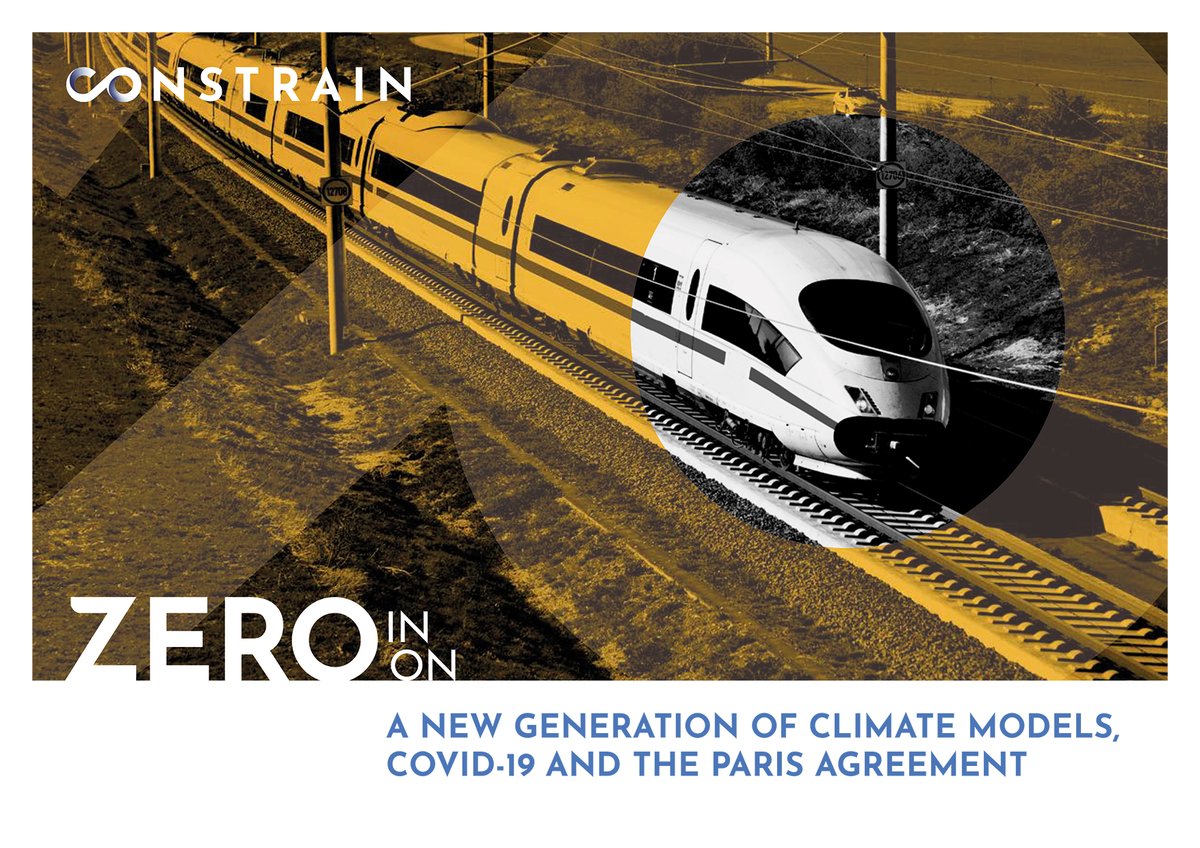
Featuring work from across CONSTRAIN
Check out our blog: constrain-eu.org/news/zero-in-2
And/or keep reading our short but sweet summary 🧵👇
2/n
Check out our blog: constrain-eu.org/news/zero-in-2
And/or keep reading our short but sweet summary 🧵👇
2/n
Analysing the new #CMIP6 #climate models has helped us to understand where global temperatures are heading, depending on the emissions we produce.
Plus where we stand in terms of the #ParisAgreement - can we stay within 1.5 degrees of temperature rise?
3/n
Plus where we stand in terms of the #ParisAgreement - can we stay within 1.5 degrees of temperature rise?
3/n
THREAD: Global Carbon Budget 2020
An unprecedented 2.4 GtCO₂ (7%) drop in emissions in 2020 due to COVID19 restrictions. But, daily emissions are already edging up towards levels last seen in late 2019.
#CarbonBudget globalcarbonproject.org/carbonbudget/i…
An unprecedented 2.4 GtCO₂ (7%) drop in emissions in 2020 due to COVID19 restrictions. But, daily emissions are already edging up towards levels last seen in late 2019.
#CarbonBudget globalcarbonproject.org/carbonbudget/i…
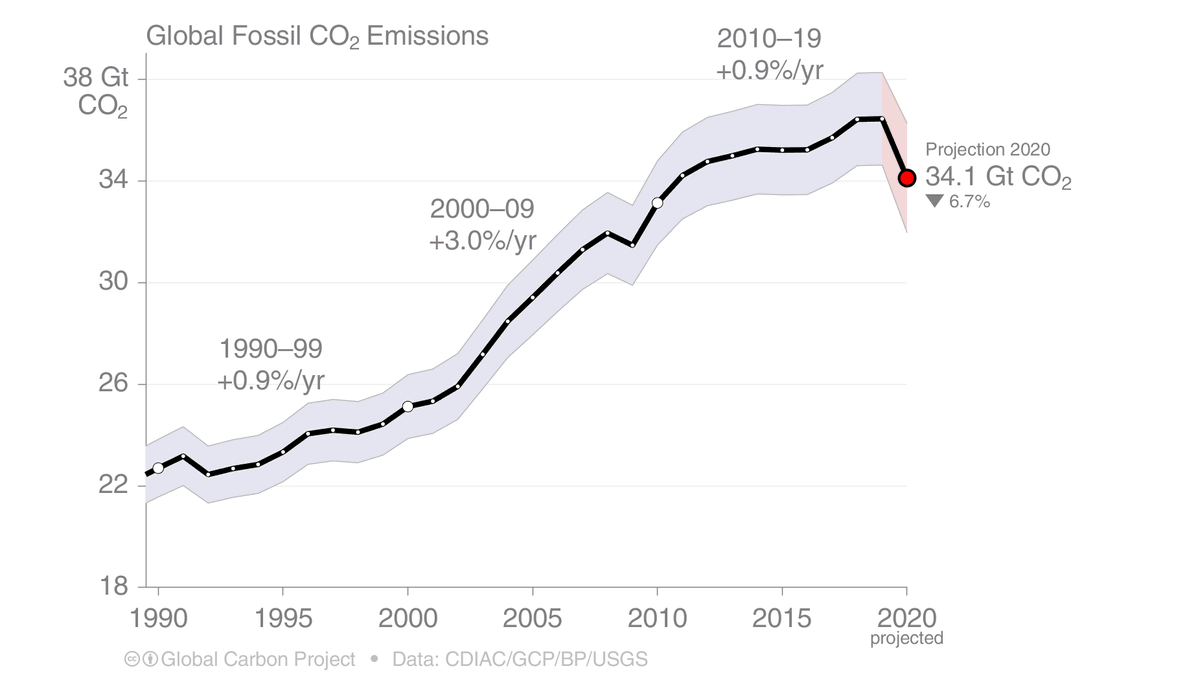
Webinar on tools for assessing national #climate pledges (NDCs) by @WRIClimate. @davidwaskow reminds: #ParisAgreement is meant to work thru an iterative process of increasing ambition (faster emission reductions), leading to #netzero emissions by 2050. (Thread 1/n) 
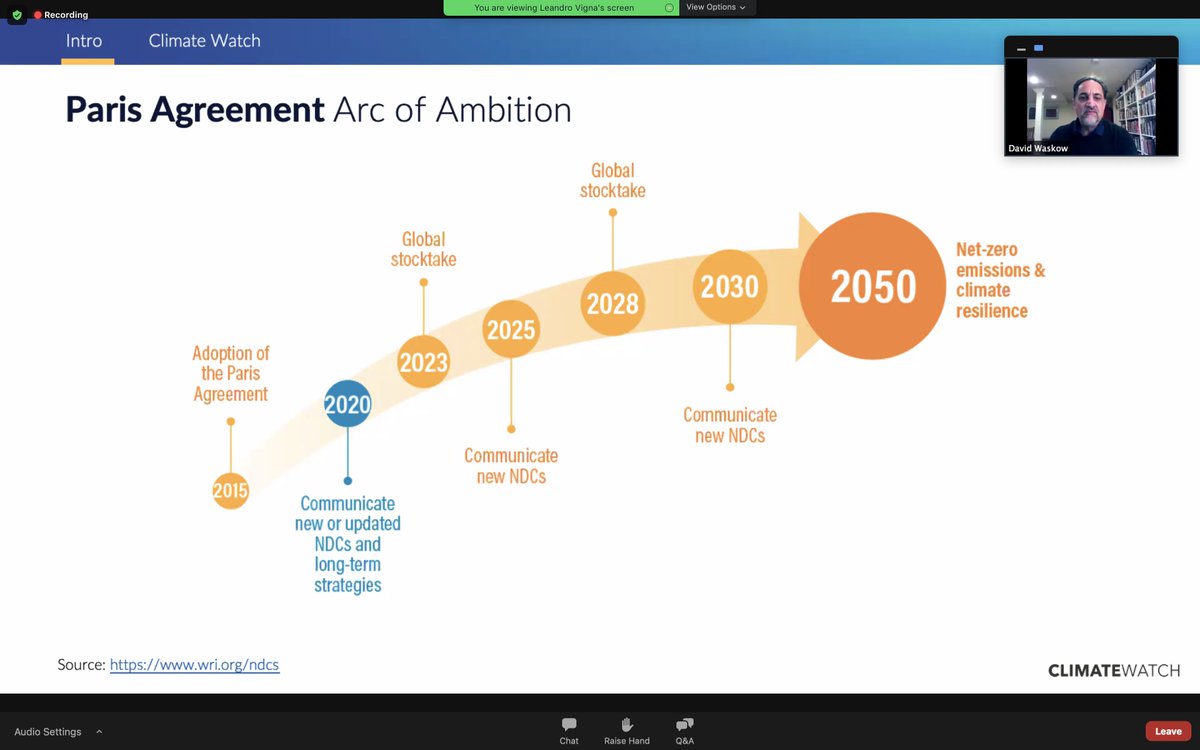
The world is currently WAY over our #carbonbudget for where we need to be to align with #ParisAgreement. Orange= countries will do under any event; red = conditional (e.g., will do if they get needed finance). We have LOTSA emissions to reduce fast @davidwaskow @WRIClimate (2/n) 
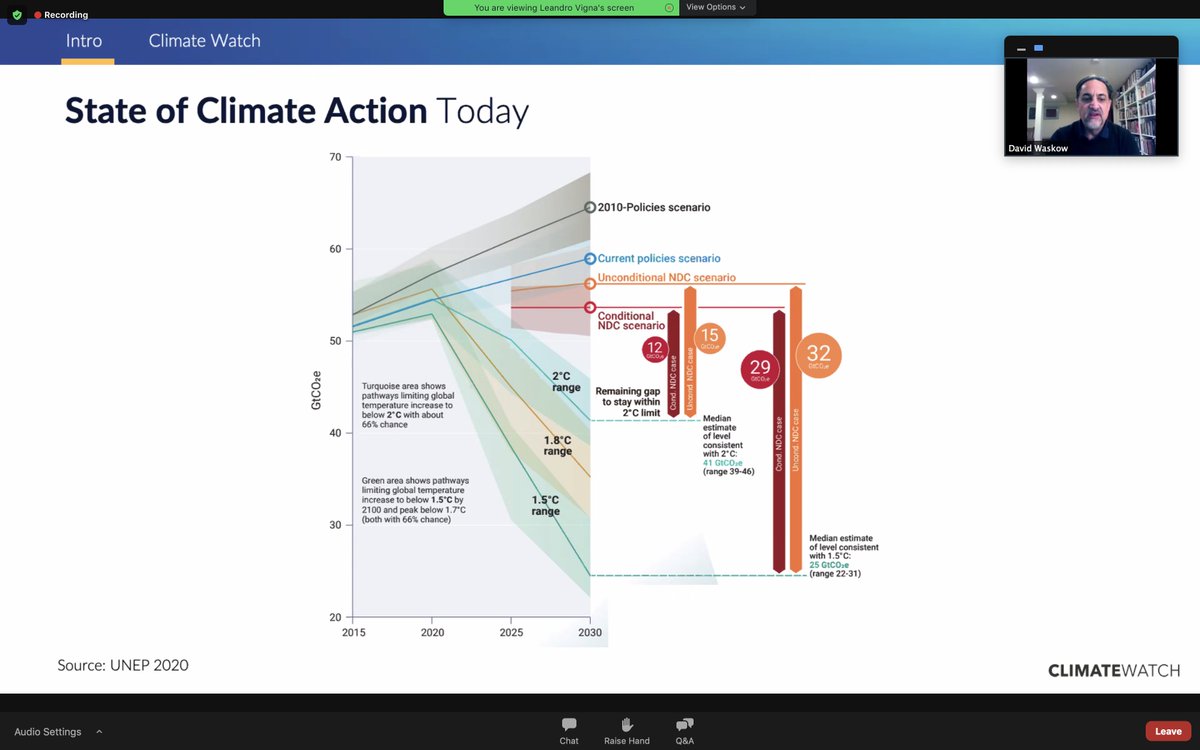
Of 21 indicators assessed for #ParisAgreement:
2 are on track (e.g., crop yields)
13 right direction but too slow (e.g., need electric vehicle sales to be 22x faster than now)
2 in wrong direction: forests, ag emissions
@davidwaskow from @climateactiontr, @WRIClimate et al 3/n
2 are on track (e.g., crop yields)
13 right direction but too slow (e.g., need electric vehicle sales to be 22x faster than now)
2 in wrong direction: forests, ag emissions
@davidwaskow from @climateactiontr, @WRIClimate et al 3/n
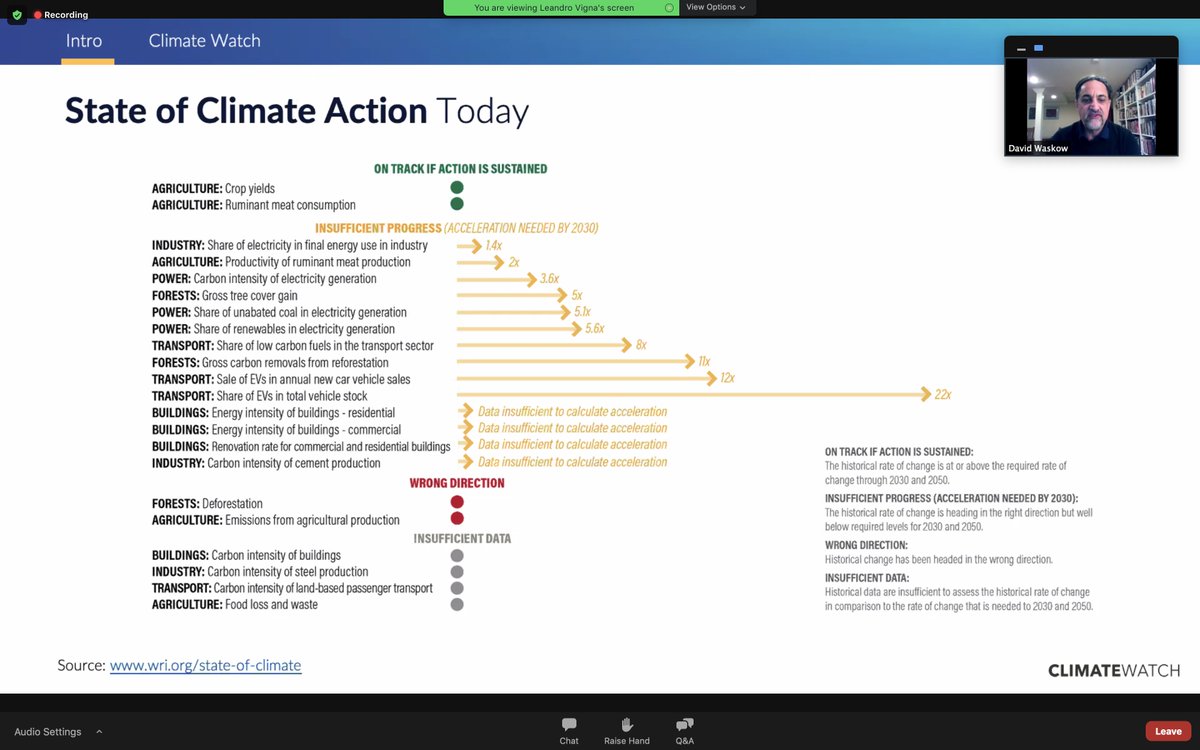
THREAD
Global fossil CO₂ emissions set to grow a slow 0.6% in 2019 [range: -0.2% to +1.5%] with robust growth in oil & natural gas, but a slight decline in coal.
#CarbonBudget #COP25 #ClimateAction globalcarbonproject.org/carbonbudget/i…
1/
Global fossil CO₂ emissions set to grow a slow 0.6% in 2019 [range: -0.2% to +1.5%] with robust growth in oil & natural gas, but a slight decline in coal.
#CarbonBudget #COP25 #ClimateAction globalcarbonproject.org/carbonbudget/i…
1/
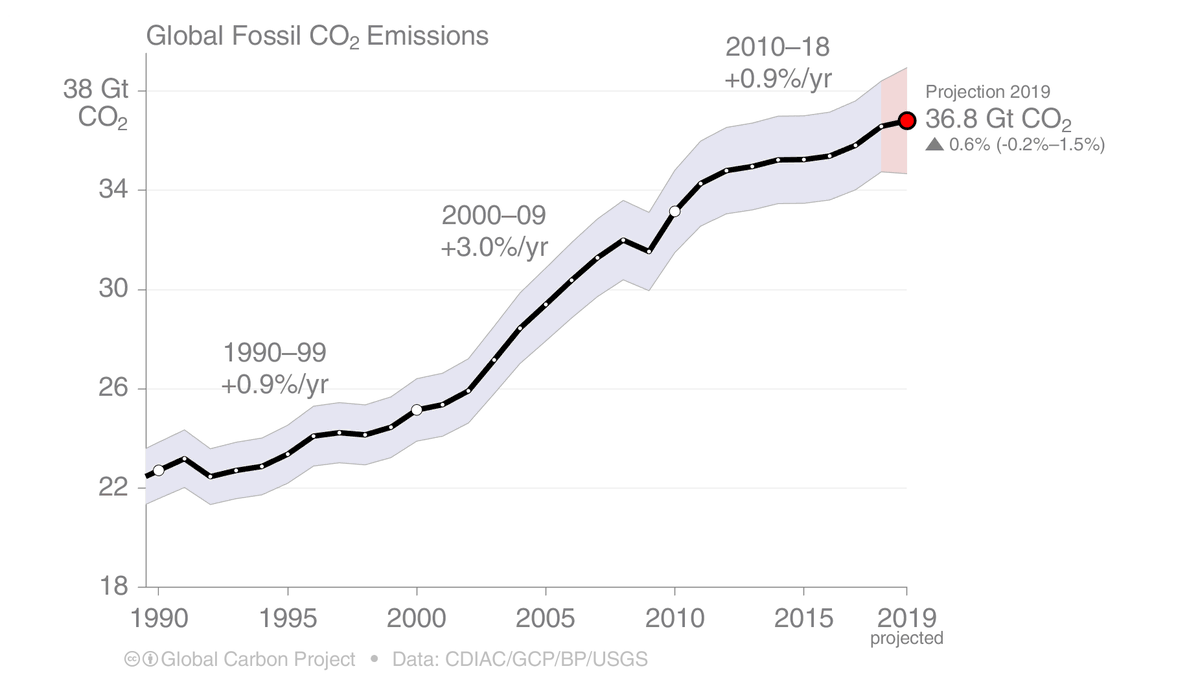
We project global coal, oil, & gas emissions for 2019
* Natural gas up 2.6% [+1.3% to +3.9%], driving >50% of growth since 2012
* Oil up 0.9% [+1.3% to +3.9%] continuing trends
* Coal down -0.9% [-2.0% to +0.2%] continuing its woes
#CarbonBudget #COP25 rdcu.be/bYf1O
2/
* Natural gas up 2.6% [+1.3% to +3.9%], driving >50% of growth since 2012
* Oil up 0.9% [+1.3% to +3.9%] continuing trends
* Coal down -0.9% [-2.0% to +0.2%] continuing its woes
#CarbonBudget #COP25 rdcu.be/bYf1O
2/
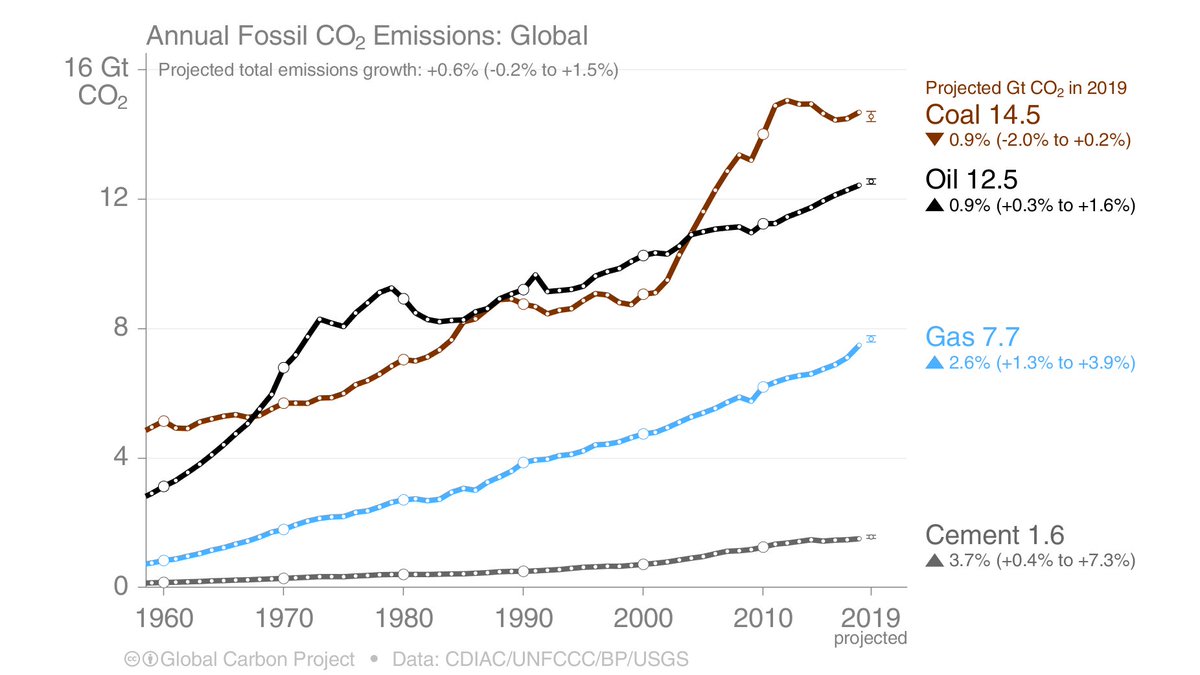
By region
* China +2.6% [+0.7% to +4.4%], GDP vs stimulus
* USA -1.7% [-3.7% to +0.3%], coal -10%
* EU28 -1.7% [-3.4% to +0.1%], coal -10%
* India +1.8% [+0.7% to +3.7%], big monsoon, weak economy
* Others +0.5% [-0.8% to +1.8%], weak economy
#COP25 rdcu.be/bYf1O
3/
* China +2.6% [+0.7% to +4.4%], GDP vs stimulus
* USA -1.7% [-3.7% to +0.3%], coal -10%
* EU28 -1.7% [-3.4% to +0.1%], coal -10%
* India +1.8% [+0.7% to +3.7%], big monsoon, weak economy
* Others +0.5% [-0.8% to +1.8%], weak economy
#COP25 rdcu.be/bYf1O
3/
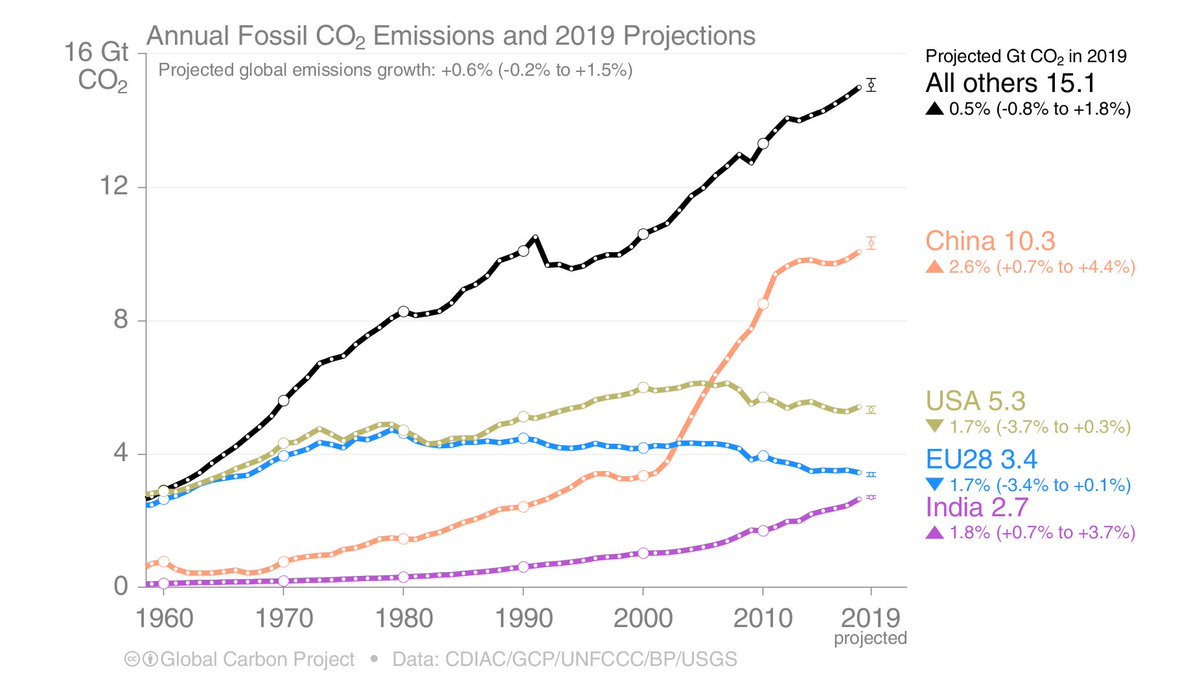
THREAD: In a new study in @nature we present a way to avoid the bias that burdens future generations and the risky strategies that current #climate change mitigation pathways suffer from.
A #climatetwitter explainer
#Fridays4Future #ClimateStrike #ParisAgreement
(1/n)
A #climatetwitter explainer
#Fridays4Future #ClimateStrike #ParisAgreement
(1/n)
Existing #ClimateChange scenarios focus on reaching a target in 2100
but by doing so weirdly suggest that the best way to achieve a #climate target is to delay action first, miss it over the next decades, and then to try to make up for it later
(2/n)
but by doing so weirdly suggest that the best way to achieve a #climate target is to delay action first, miss it over the next decades, and then to try to make up for it later
(2/n)
This puts put a disproportionate burden on future generations, who:
-will suffer higher #climate impacts in their lives
-are burdened with later cleaning up the mess by actively pulling #CO2 out of the air
This strategy is very risky and can be avoided
#Fridays4Future
(3/n)
-will suffer higher #climate impacts in their lives
-are burdened with later cleaning up the mess by actively pulling #CO2 out of the air
This strategy is very risky and can be avoided
#Fridays4Future
(3/n)
THREAD (Global Fossil CO₂ Emissions)
Global fossil CO₂ emissions are on track to rise more than 2% in 2018 (2.7%, range 1.8% to 3.7%). Emissions rose 1.6% in 2017 (leap-year adjusted) after a temporary slowdown from 2014 to 2016.
#CarbonBudget #COP24 globalcarbonproject.org/carbonbudget/i…
Global fossil CO₂ emissions are on track to rise more than 2% in 2018 (2.7%, range 1.8% to 3.7%). Emissions rose 1.6% in 2017 (leap-year adjusted) after a temporary slowdown from 2014 to 2016.
#CarbonBudget #COP24 globalcarbonproject.org/carbonbudget/i…
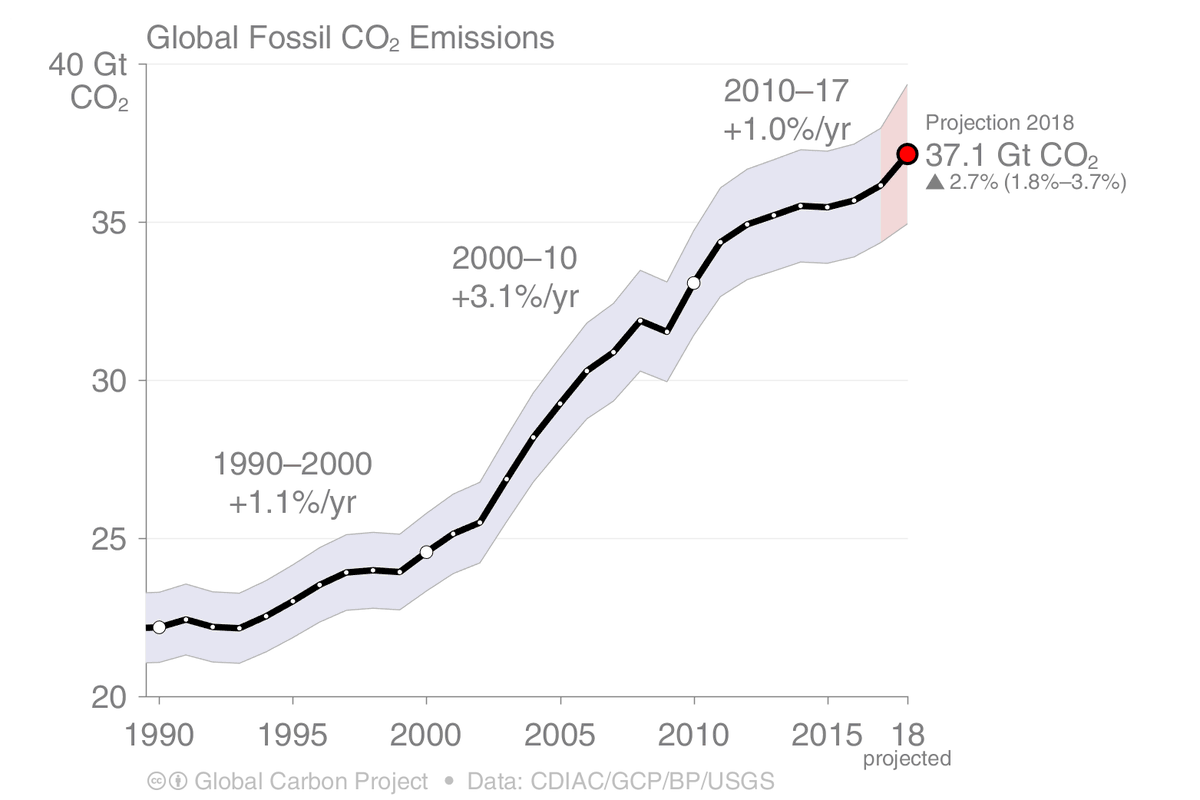
Countries that need to slowdown:
* China, up 4.7% [2.0–7.4%]
* India, up 6.3% [4.3–8.3%]
* Others (largely developing), up 1.8% [0.5–3.0%]
Countries that need faster reductions:
* USA, up 2.5% [0.5–4.5%]
* EU, down 0.7% [-2.6–1.3%]
#CarbonBudget #COP24 globalcarbonproject.org/carbonbudget/i…
* China, up 4.7% [2.0–7.4%]
* India, up 6.3% [4.3–8.3%]
* Others (largely developing), up 1.8% [0.5–3.0%]
Countries that need faster reductions:
* USA, up 2.5% [0.5–4.5%]
* EU, down 0.7% [-2.6–1.3%]
#CarbonBudget #COP24 globalcarbonproject.org/carbonbudget/i…
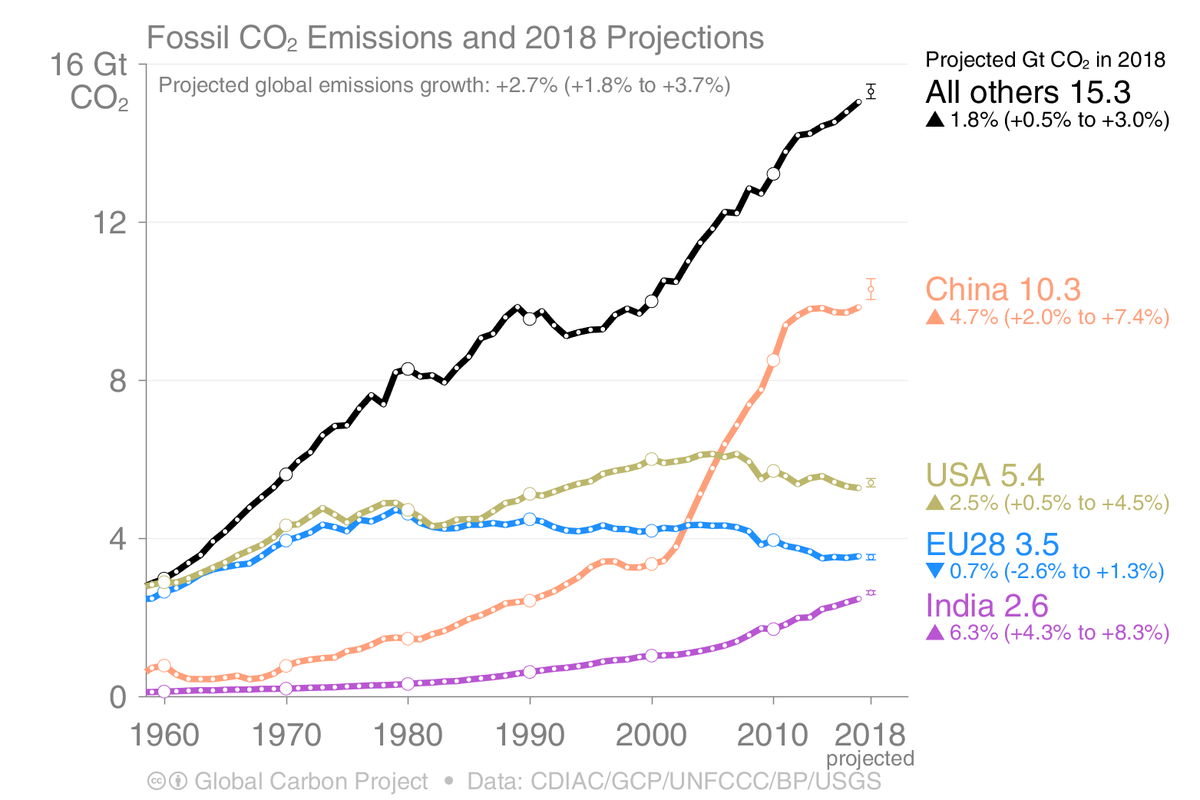
There is a broad spread in CO₂ emissions per capita, but for a chance of 1.5°C or 2°C, countries with low per capita emissions also have to reduce emissions.
Yes, developed countries have to do more, but they can’t do it alone!
#CarbonBudget #COP24 globalcarbonproject.org/carbonbudget/i…
Yes, developed countries have to do more, but they can’t do it alone!
#CarbonBudget #COP24 globalcarbonproject.org/carbonbudget/i…

Steeling myself with a strong coffee to sit down and read major new report on avoiding dangerous #climatechange (@IPCC_CH #SR15, available here: ipcc.ch/report/sr15/). My takes to follow (1/n)
As always, the #peerreview effort by @IPCC_CH is Herculean. A couple hundred volunteer scientists read & cited 6,000+ studies to support conclusions w/ evidence. Responded to 42,001 comments in 3 rounds of review. The most robust process there is to establish scientific consensus 

Now, this #SR15 report title is descriptive, but doesn't exactly roll off the tongue... 

